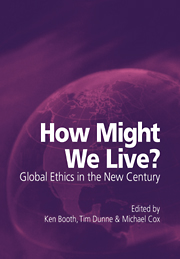Book contents
- Frontmatter
- Contents
- Notes on Contributors
- Acknowledgements
- Foreword
- Introduction: How Might We Live? Global Ethics in a New Century
- Individualism and the Concept of Gaia
- Bounded and Cosmopolitan Justice
- Globalization From Above: Actualizing The Ideal Through Law
- A More Perfect Union? The Liberal Peace and the Challenge of Globalization
- International Pluralism and the Rule of Law
- Towards a Feminist International Ethics
- Contested Globalization: The Changing Context and Normative Challenges
- Universalism and Difference in Discourses of Race
- Does Cosmopolitan Thinking Have a Future?
- Individuals, Communities and Human Rights
- Thinking About Civilizations
- Index
Introduction: How Might We Live? Global Ethics in a New Century
Published online by Cambridge University Press: 04 August 2010
- Frontmatter
- Contents
- Notes on Contributors
- Acknowledgements
- Foreword
- Introduction: How Might We Live? Global Ethics in a New Century
- Individualism and the Concept of Gaia
- Bounded and Cosmopolitan Justice
- Globalization From Above: Actualizing The Ideal Through Law
- A More Perfect Union? The Liberal Peace and the Challenge of Globalization
- International Pluralism and the Rule of Law
- Towards a Feminist International Ethics
- Contested Globalization: The Changing Context and Normative Challenges
- Universalism and Difference in Discourses of Race
- Does Cosmopolitan Thinking Have a Future?
- Individuals, Communities and Human Rights
- Thinking About Civilizations
- Index
Summary
Choice is at the heart of ethics, but our choices are never entirely free. Human choice is fettered by history, by context, by biology, by expected consequences and by imagination. Every choice has a history, and a price. In world politics, the scope for choice seems particularly fettered. Historical and geographical contextualization, and projected price have meant that politics beyond state borders has traditionally been understood as an arena of necessity, not ethics. Choice may never be entirely free, but neither is it totally determined; to argue it is, as a result of biology, the unconscious, predestination or whatever would be to abolish ethics. This is not our position, or that of the contributors. We do however recognize that the fettering of ethical choice begins at birth.
Humans are nationalized or tribalized once we are born almost as quickly as we are genderized. We learn to live in concentric circles of loyalty, sympathy, duty and conceptions of justice; and for the most part, the tighter the circle, the stronger have been the moral codes shaping behaviour. Even so, the idea that there are natural limits to ethics has not gone uncontested. There has been a long tradition—while still privileging the family bond—which has stressed the need to think ethically from the outside inwards, rather than the opposite. Conceiving ethics from what Henry Sidgwick called ‘the point of view of the universe’ (an all-embracing perspective which accords strangers no less consideration than one's own kind, however defined) has been a two-thousand year tradition.
- Type
- Chapter
- Information
- How Might We Live? Global Ethics in the New Century , pp. 1 - 28Publisher: Cambridge University PressPrint publication year: 2001
- 1
- Cited by

